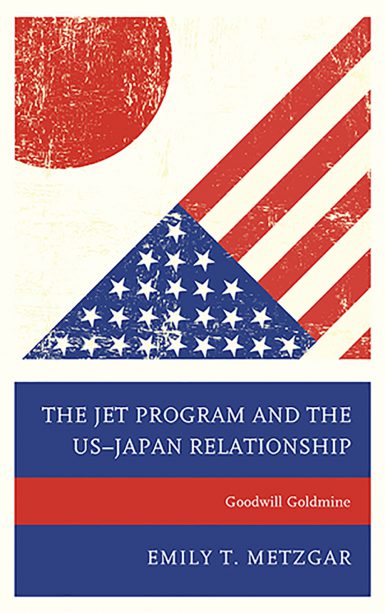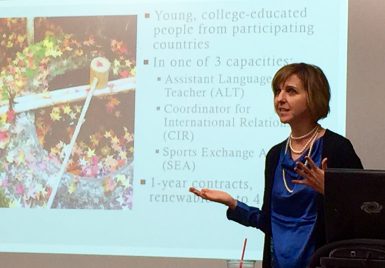Metzgar book explores untapped benefit of JET program

Shortly after college graduation, Associate professor Emily Metzgar moved to the small Japanese town Daito in the Shimane prefecture, in an area nicknamed the “backside of Japan.”
Her degree was in political science and French, but her job was to teach English to Japanese junior high students.
Affordable international travel lured Metzgar to the Japan Exchange and Teaching Program, a Japanese government-sponsored program that brings foreigners to Japan each year to teach language in schools and work as interpreters/translators. The program has 60,000 alumni, and about half of the participants come from the U.S.
The JET program is celebrating its 30th anniversary this year. It’s sometimes reviewed as a failure, since the country’s English language skills haven’t improved much overall during that time period, Metzgar said. But in her new book, Goodwill Goldmine: The JET Program and the U.S.-Japan Relationship, she argues the program has cultivated a valuable, though perhaps less obvious, benefit.

“I find that the JET program really functions very well as a public diplomacy effort,” Metzgar said. “The evidence of this can be found in the wide range of expertise, interests and geographic spread of American alumni.”
American JET alumni are diplomats, corporate executives and university professors. Many (including Metzgar) didn’t have Japanese language skills or any other connection to the country when they arrived. But most still feel a personal connection to and investment in the country and its culture, even decades after their year or two with the JET program.
Metzgar’s findings are based on a survey she conducted of American JET alumni in 2011. The survey drew about 500 respondents. After analyzing quantitative data, she interviewed some of the respondents to get a deeper understanding of their feelings and experiences.
The book was published July 21 by Rowman & Littlefield.
Despite the widespread public diplomacy resource the program has cultivated, Metzgar said the Japanese government hasn’t done much to track or keep in touch with program alumni, meaning it isn’t taking advantage of the resource. It has adopted a complete “hands-off” approach to alumni relations, she said.

“That means that they’re missing out on this amazing goodwill goldmine of alumni. Every (alumnus I interviewed) said they wished they had more interaction with the Japanese government. I think the challenge is going to be tapping into that community,” Metzgar said. “They have a nuanced understanding of Japan that can really be of benefit to the organizations and institutions that they work at.”
Metzgar’s book is the first study of the JET program of this extent in the context of public diplomacy. In fact, she found that very little has even been written about the program in the mainstream media. She initially planned to do a content analysis of national news stories on the program, but there wasn’t enough material to work with.
When she met with program organizers from the three sponsoring ministries — the Ministry of Education, Culture, Sports, Science and Technology, the Ministry of Foreign Affairs and the Ministry of Internal Affairs and Communications — Metzgar said they were aware of the benefits and problems she found. She said she hopes the book is well-received, even if some of it “is going to sting.”
Metzgar is a former U.S. diplomat, policy analyst and opinion writer. She is also affiliated faculty with the Department of International Studies in the School of Global and International Studies. Her research focuses on public diplomacy, international communication and the role of media and society. She is conducting research for another book focused on the policy and politics of U.S. information diplomacy since World War II.

